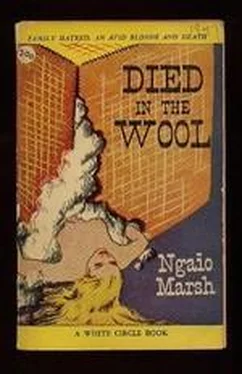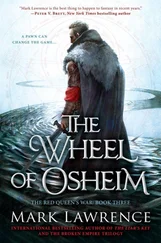Ngaio Marsh - Died in the Wool
Здесь есть возможность читать онлайн «Ngaio Marsh - Died in the Wool» — ознакомительный отрывок электронной книги совершенно бесплатно, а после прочтения отрывка купить полную версию. В некоторых случаях можно слушать аудио, скачать через торрент в формате fb2 и присутствует краткое содержание. Жанр: Классический детектив, на английском языке. Описание произведения, (предисловие) а так же отзывы посетителей доступны на портале библиотеки ЛибКат.
- Название:Died in the Wool
- Автор:
- Жанр:
- Год:неизвестен
- ISBN:нет данных
- Рейтинг книги:4 / 5. Голосов: 1
-
Избранное:Добавить в избранное
- Отзывы:
-
Ваша оценка:
- 80
- 1
- 2
- 3
- 4
- 5
Died in the Wool: краткое содержание, описание и аннотация
Предлагаем к чтению аннотацию, описание, краткое содержание или предисловие (зависит от того, что написал сам автор книги «Died in the Wool»). Если вы не нашли необходимую информацию о книге — напишите в комментариях, мы постараемся отыскать её.
Died in the Wool — читать онлайн ознакомительный отрывок
Ниже представлен текст книги, разбитый по страницам. Система сохранения места последней прочитанной страницы, позволяет с удобством читать онлайн бесплатно книгу «Died in the Wool», без необходимости каждый раз заново искать на чём Вы остановились. Поставьте закладку, и сможете в любой момент перейти на страницу, на которой закончили чтение.
Интервал:
Закладка:
He saw that they were young enough to be flattered and stimulated by this assurance. “There, now!” said Fabian triumphantly.
“But,” said Alleyn, “I don’t believe for a moment that you will succeed. How long does it take a psychoanalyst to complete his terrifying course of treatment? Months, isn’t it? His aim, as I understand it, is to get to the bottom, to spring-clean completely, to arrive, in fact, at the clinical truths. Aren’t you, Losse, attempting something of that sort? If so, I’m sure you cannot succeed, nor, as a policeman, would I want you to do so. As a policeman, I am not concerned with the whole clinical truth. Faced with it, I should probably find myself unable to make any arrest, ever. I am required only to produce facts. If your discussion of Mrs. Rubrick’s character and that of her husband can throw the smallest ray of light along the path that leads to an unknown murderer who struck her from behind, suffocated her, bound up her body, and concealed it in a wool press, then from the official point of view it will have been valuable. If, at the same time, somewhere along that path there is the trace of an enemy agent, then again from my point of view, as an investigator of espionage in this country, it will have been valuable. If, finally, it relieves the burden of secrecy under which you have all suffered, you, also, may profit by it, though, as you have already seen, the process is painful and may be dangerous.”
“We realize that,” Fabian said.
“Do you fully realize it? You told me at first that there was a complete absence of motive among you. Would you still say so? Look what has come out. Captain Grace was Mrs. Rubrick’s heir. That circumstance, which suggests the most common of all motives, has of course always been recognized by the police and must have occurred to all of you. You, Losse, advanced a theory that you yourself in a condition of amnesia attacked Mrs. Rubrick and killed her. What’s more, as you developed this theme you also revealed a motive, Mrs. Rubrick’s opposition to your engagement to Miss Harme. Now, under this same process of self-revelation, Miss Lynne must also be said to have a motive. Most courageously she has told us that she had formed a deep attachment for the murdered woman’s husband and you, Losse, say that this attachment obviously was returned. The second most common motive appears in both your case and hers. You have said, bravely, that none of you has anything to fear from this discussion. Are you sure you have the right to make this statement? You are using this room as a sort of confessional but I am bound by no priestly rule. What you tell me I shall consider from the practical point of view and may afterwards use in the report I send to your police. I should neglect my duty if, before she goes any further, I didn’t remind Miss Lynne of all the circumstances.” Alleyn paused and rubbed his nose. “That all sounds pompous,” he said. “But there it is. The whole thing’s a departure from the usual procedure. I doubt if any collection of possible suspects had ever before decided to have what Miss Harme has aptly described as a verbal strip-tease, before an investigating officer.” He looked at Terence. “Well, now, Miss Lynne,” he said, “if you don’t want to go on—”
“It’s not because I’m afraid,” she said. “I didn’t do it and any attempt to prove I did would fail. I suppose I ought to be afraid but I’m not. I don’t feel in the least anxious for myself.”
“Very well. Losse has suggested that there is some significance in the change, during the last week of Mrs. Rubrick’s life, in her manner towards her husband. He has suggested that you can explain this change. Is he right?”
She did not answer. Slowly and, as it seemed, reluctantly, she raised her eyes and looked at the portrait of Florence Rubrick.
“Terry!” said Ursula suddenly. “Did she know? Did she find out?”
Fabian gave a sharp ejaculation and Terence turned, not upon Ursula but upon him.
“You idiot, Fabian,” she said. “You unutterable fool.”
The fire had burnt low, and the room was colder and stale with tobacco smoke.
“I give it up,” said Douglas loudly. “I never was any good at riddles and I’m damned if I know half the time what you’re all getting at. For God’s sake let’s have some air in this room.”
He went to the far end of the study, jerked back the curtains, and pushed open a French window. The night air came in, not as a wind, but stilly, with a tang of extreme cleanliness. The moon was up and, across the plateau, fifty miles away, it shone on the Cloud Piercer and his attendant peaks. Alleyn joined Douglas at the window. “If I spoke,” he thought, “my voice would go out towards those mountains and between my moving lips and that distant snow there would be only clear darkness.” He had noticed, on the drive up to Mount Moon, that the flats in front of the homestead were swampy and studded with a few desultory willows. Now, in the moonlight, he caught a glint of water and he heard the cry of wild duck and the beat of wings. Behind him in the room, someone threw wood upon the fire and Alleyn’s shadow flickered across the terrace.
“Need we freeze?” Ursula asked fretfully. Douglas reached out his hand to the French window but before he shut it or drew the curtain a footfall sounded briskly and a man walked along the terrace towards the north side of the house. As he reached the part of the terrace that was lit from the room he was seen to be wearing a neat black suit and a felt hat. It was Markins, returning from his visit to the manager’s cottage. Douglas slammed the French window and pulled the curtain across it.
“And there goes the expert,” he said, “who runs about the place, scot-free, while we sit yammering a lot of highfalutin bilge about the character of the woman he may have killed. I’m going to bed.”
“He’ll bring the drinks in a minute,” said Fabian. “Why not wait and have one?”
“If he’s got wind of this I wouldn’t put it past him to monkey with the decanter.”
“Honestly, Douglas!” Fabian and Ursula said together. “You are—”
“All right, all right,” Douglas said angrily. “I’m a fool. Say no more.” He flung himself down on the sofa again but this time he did not rest his arm along the back behind Terence. Instead he eyed her with an air of discomfort and curiosity.
“So you prefer to leave Miss Harme’s question unanswered,” Alleyn said to Terence.
She had picked up her knitting as if hoping by that gesture to recapture something of her composure. But her hands turned her work over, rolling the scarlet mesh round the white needles and, as aimlessly, spreading it out again across her knees.
“You force me to speak of it,” she said. “All of you. You talk about us all agreeing to this discussion, Fabian. When you and Ursula and Douglas planned it how could I not agree? It’s not my business to refuse. I’m an outsider. I was paid to work for Mrs. Rubrick and now you, Fabian, pay me to work for you in your garden. It’s not my business to refuse.”
“Nonsense, Terry,” said Fabian.
“You’ve never been in my position. You don’t understand. You’re all very kind and informal and treat me, as we say in my class, almost like one of yourselves. Almost, not quite.”
“My dear girl, that’s an insult to me, at least. You know quite enough about my views to realize that any such attitude is revolting to me. ‘Your class.’ How dare you go class-conscious at me, Terry?”
“You’re my boss. You were not too much of a communist to accept Mount Moon when he left it to you.”
“I think,” said Alleyn crisply, “that we might come back to the question which, believe me, Miss Lynne, you are under no compulsion to answer. This is it. Did Mrs. Rubrick, during the last week of her life, become aware of the attachment between you and her husband?”
Читать дальшеИнтервал:
Закладка:
Похожие книги на «Died in the Wool»
Представляем Вашему вниманию похожие книги на «Died in the Wool» списком для выбора. Мы отобрали схожую по названию и смыслу литературу в надежде предоставить читателям больше вариантов отыскать новые, интересные, ещё непрочитанные произведения.
Обсуждение, отзывы о книге «Died in the Wool» и просто собственные мнения читателей. Оставьте ваши комментарии, напишите, что Вы думаете о произведении, его смысле или главных героях. Укажите что конкретно понравилось, а что нет, и почему Вы так считаете.










